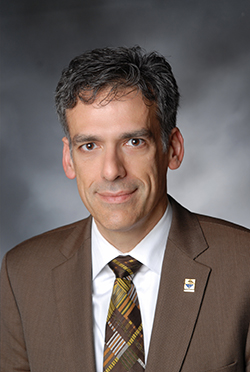Visiting Scholar
Since 1956, the Phi Beta Kappa Visiting Scholar Program has offered undergraduates across the nation the opportunity to spend time with some of America's most distinguished scholars. The purpose of the program is to contribute to the intellectual life of the campus by making possible an exchange of ideas between the Visiting Scholars and the resident faculty and students.
 Dr. Rigoberto Hernandez
Dr. Rigoberto Hernandez
Public Lecture
Monday, March 21, 2016
7-8 p.m.
K-State Student Union
Flint Hills Room
This event is free and open to the public
Lecture Title: Lost in Projection
What is lost in the projection of how others frame you? That is, there is a potential disconnect between what others expect of you and the person who you believe to be yourself. To what extent are you bound by what others expect of you? Such expectations may arise from how others have seen you in the past or perhaps by whom they see on first impression. I came to the United States as a child, a Cuban immigrant who spoke no English but proud to be able to count to ten without too much of an accent. Children grow and learn. Surely, they can not be bound by that early frame. As adults, we may not grow physically, but we also learn. And yet, we have a tendency to hold others to the frames that we first see of them. Even more dangerous to each of us is the fact that the frame is often projected onto us by others, and not always correctly. I will discuss my own career trajectory, weaving in how projections and implicit bias, sometimes accelerated and other times disadvantaged my career.
Biography
Dr. Rigoberto Hernandez is a Professor in the School of Chemistry and Biochemistry at Georgia Tech, a Co-Director of the Center for Computational Molecular Science and Technology and the Director of the Open Chemistry Collaborative in Diversity Equity (OXIDE). He holds a B.S.E. in Chemical Engineering and Mathematics from Princeton University (1989), and a Ph.D. in Chemistry from the University of California, Berkeley (1993). (Hernandez was born in Güinez, Havana, Cuba but was raised and educated in the United States of America since he was in primary school. He is a U.S. citizen by birthright.)
Dr. Hernandez is the recipient of a National Science Foundation (NSF) CAREER Award (1997), Research Corporation Cottrell Scholar Award (1999) , the Alfred P. Sloan Fellow Award (2000), a Humboldt Research Fellowshp (2006-07), the ACS Award for Encouraging Disadvantaged Students into Careers in the Chemical Sciences (2014), and the CCR Diversity Award (2015). He is a Fellow of the American Association for the Advancement of Science (AAAS, 2004), the American Chemical Society (ACS, 2010), and the American Physical Society (APS, 2011). At Georgia Tech, he has served as the first Blanchard Assistant Professor of Chemistry (1999-2001), the first Goizueta Foundation Junior Rotating Faculty Chair (2002-07) and a Vasser Woolley Faculty Fellow (2011-13). His recent board memberships include the National Academies Panel within the Army Research Laboratory Technical Assessment Board (2005-2011), the National Academies Board on Chemical Sciences and Technology (2007-2010), the Telluride Summer Research Conference Board of Directors (2007-09), the NIH Study Section on Molecular Structure and Function B (MSFB, 2009-2013), the Research Corporation Cottrell Scholars Advisory Committee (2011-16), the DOE Committee of Visitors (Division of Chemical Sciences, Geosciences and Bio-sciences, 2014) and the American Chemical Society Board of Directors (2014-2016).
Dr. Hernandez's research programs are currently funded by the NSF, AFOSR and Kimberly Clark Corporation. The OXIDE effort is cofunded by the NSF, DOE and NIH.
Research Interests
Dr. Hernandez’s research area can be broadly classified as the theoretical and computational chemistry of systems far from equilibrium. This includes a focus on microscopic reaction dynamics and their effects on macroscopic chemical reaction rates in arbitrary solvent environments. His current projects involve questions pertaining to the diffusion of mesogens in colloidal suspensions and liquid crystals, the structure and dynamics of assemblies of Janus and other patchy particles, fundamental advances in transition state theory, the role of molecular reactions in nonequilibrium air and the dynamics of protein folding and rearrangement.